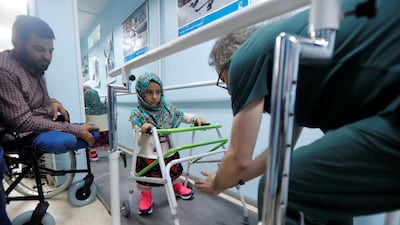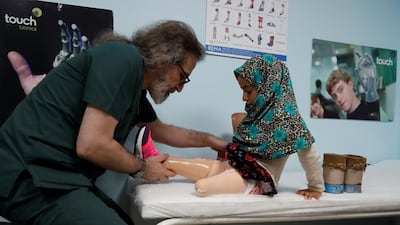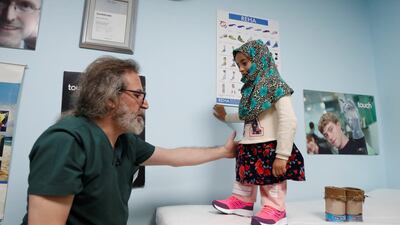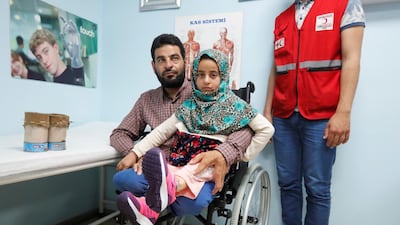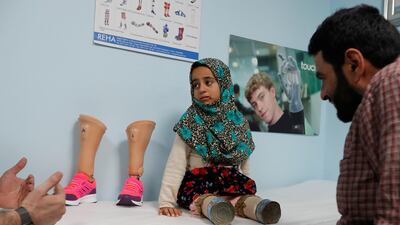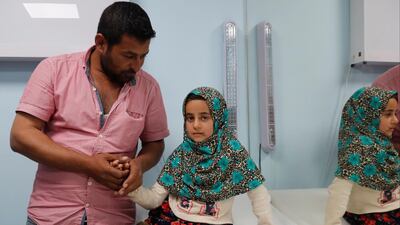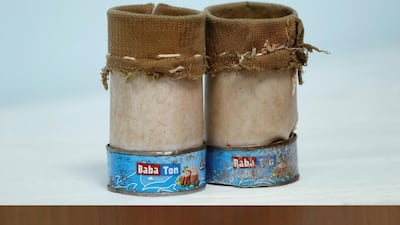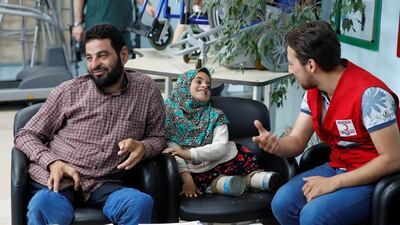Eight-year-old Maya Merhi, who was born with no legs, had to shuffle around a camp in northern Syria on makeshift limbs fashioned from old tubing and tin cans.
Now she is taking her first tentative steps in Istanbul on prosthetic legs, after images of her struggling in the tent encampment in Idlib appeared on social media and she was brought to Turkey.
Her father Mohammed Merhi, 34, who suffers from the same congenital disorder as his daughter, had fled fighting in the city of Aleppo with his wife and six children and took refuge in rebel-controlled Idlib.
"We faced many challenges, especially moving from the place we lived in tents. The situation in general was difficult," he said.
Maya, like her father, had been able to move around more easily by crawling. But recent surgery, which further reduced the length of her limbs had impeded this.
"After the operation, she was not able to move around and was sitting the whole time in a tent," Mr Merhi told AFP in an interview at the Istanbul clinic.
"In order for her to move out of the tent, I had the idea to fix on her limbs tubing, stuffed with a spongy material to reduce the pressure.
"Then, I added two empty cans of tuna because the plastic was not strong enough to resist the friction with the ground."
With these impromptu prosthetics, Maya was able to walk outside of the tent and could even go on her own to the camp's school.
Mr Merhi, who has five other children none of whom suffer from the condition, said he replaced the plastic tubing once a month and the tins once a week.
Doctors hope Maya will be fully able to walk with her new prosthetic legs in three months, and they say that her father's determination made their work easier.
"He did everything to make this child walk and God helped them," Turkish prosthetic specialist Mehmet Zeki Culcu said. "Normally nobody would believe she could walk with these makeshift limbs."
Maya's father will also be given prosthetic legs at the Turkish clinic. But it's above all the fate of his daughter that worries him.
"It's more important that she can walk so that she is autonomous. It would be like a new life for us," he said.
"I dream of seeing her walk, going to school and back without suffering."
Dr Culcu said that he had been "very touched" by the pictures of Maya walking on her tins and had decided to take on the cost of her prosthetic legs and those of her father.
"We have been contacted by people all over the world who want to make the donation. But this issue is closed and I will take on the cost," he said.
He said the homemade limbs her father had constructed in the Idlib camp were likely to prove of huge benefit because they had got Maya used to walking.
"We can't really call what she has prosthetics," Dr Culcu said.
"It's a kind of makeshift system for her to walk. With the energy of desperation, without any means, her father turned that suffering into hope."
